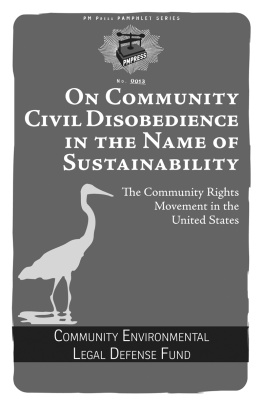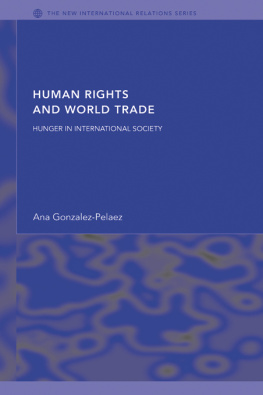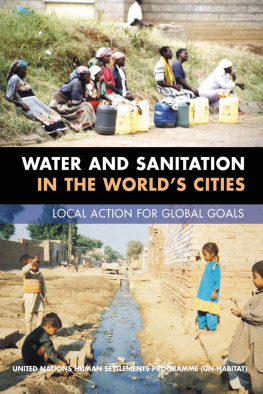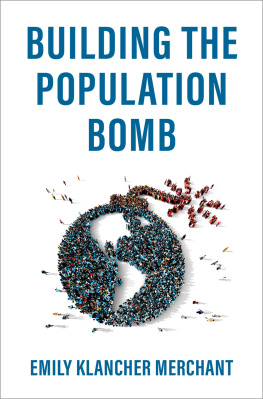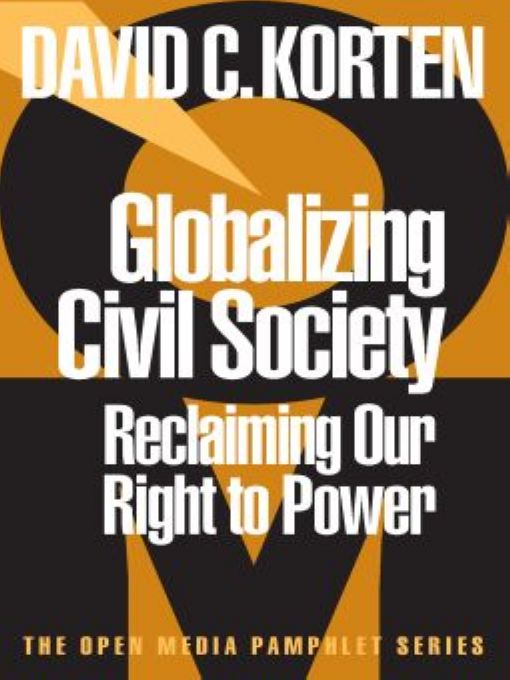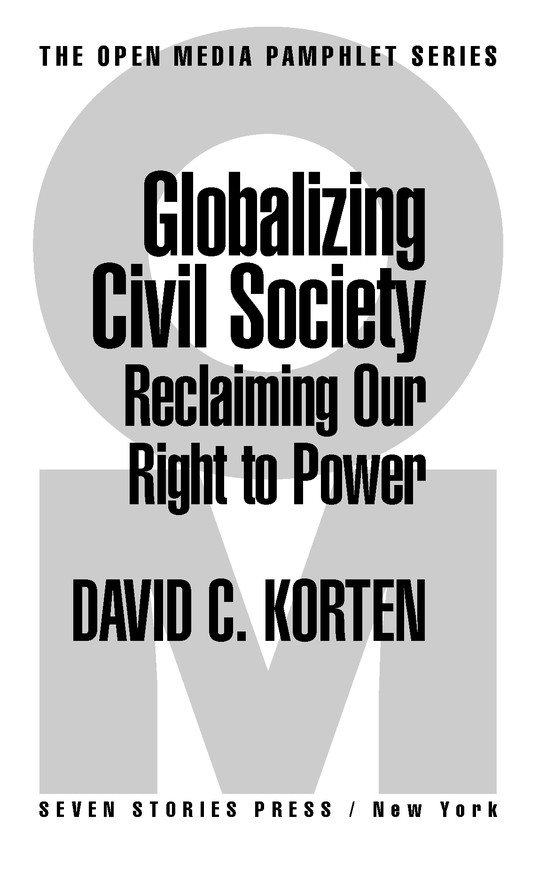Table of Contents
THE OPEN MEDIA PAMPHLET SERIES
OTHER OPEN MEDIA PAMPHLET SERIES TITLES
CORPORATE MEDIA AND THE THREAT TO DEMOCRACY
Robert W. McChesney
80 pages / $5.95 / ISBN: 1-888363-47-9
MEDIA CONTROL: THE SPECTACULAR ACHIEVEMENTS
OF PROPAGANDA Noam Chomsky
64 pages / $5.95 / ISBN: 1-888363-49-5
GENE WARS: THE POLITICS OF BIOTECHNOLOGY
Kristin Dawkins
64 pages / $4.95 / ISBN: 1-888363-48-7
ZAPATISTA ENCUENTRO: DOCUMENTS FROM THE
1996 ENCOUNTER FOR HUMANITY AND AGAINST NEOLIBERALISM
The Zapatistas
64 pages / $5.95 / ISBN: 1-888363-58-4
PROPAGANDA, INC.: SELLING AMERICAS CULTURE
TO THE WORLD Nancy Snow
80 pages / $5.95 / ISBN: 1-888363-74-6
A SUSTAINABLE ECONOMY FOR THE 21ST CENTURY
Juliet Schor
64 pages / $5.95 / ISBN: 1-888363-75-4
THE UMBRELLA OF U.S. POWER
Noam Chomsky
80 pages / $5.95 / 1-888363-85-1
ACTS OF AGGRESSION: POLICING ROGUE STATES
Noam Chomsky, Edward W. Said, Ramsey Clark
64 pages / $6.95 / ISBN: 1-58322-005-4
THE PROGRESSIVE GUIDE TO
ALTERNATIVE MEDIA AND ACTIVISM
Project Censored
144 pages / $10.00 / ISBN: 1-888363-84-3
MICRORADIO AND DEMOCRACY
Greg Ruggiero
64 pages / $5.95 / ISBN: 1-58322-000-3
THE LAST ENERGY WAR: THE BATTLE OVER UTILITY DEREGULATION
Harvey Wasserman
80 pages / $5.95 / ISBN: 1-58322-017-8
POEMS FOR THE NATION: A COLLECTION OF CONTEMPORARY
POLITICAL POEMS Edited by Allen Ginsberg with Andy Clausen and Eliot Katz
80 pages / $5.95 / ISBN: 1-58322-012-7
ITS THE MEDIA, STUPID
John Nichols and Robert W. McChesney
128 pages / $10.00 / ISBN: 1-58322-029-1
TO ORDER ADDITIONAL SERIES TITLES CALL 1 (800) 596-7437.
What is needed to provide healthy and sustainable living spaces for a growing world population on a finite planet? It is surely one of the most important questions of our time. Yet the institutions to which we have entrusted decision making power over the use of the worlds resources are so focused on the promotion of expanded international trade and financial speculation that they scarcely seem to notice the rapidly deteriorating situation in much of the world with regard to the environment, human rights, food security, population, unemployment, poverty, and the social fabric. The evidence accumulates almost daily leading to the inescapable conclusion that our dominant institutions are not only failing, their favored policies are actively accelerating the deterioration. It is left to civil society to expose the causes of the institutional dysfunction and to define and pursue alternatives.
The search for these causes and alternatives has become a growing concern of activist groups and NGOs (non-governmental organizations) at every level of society and has unfolded into an expanding civil society dialogue. While the views of civil society are as diverse as its participants, a line of analysis has arisen from this dialogue that has a broad and growing base of support among people of widely varied backgrounds who share a deep concern for the future of our world. It presents a perspective seldom heard in official forums, perhaps because it is understandably difficult for those who represent official institutions to engage in public discussion of issues that bear on the legitimacy of the institutions they represent.
I have been an active participant in the unfolding civil society dialogue and my own thinking has been deeply influenced by it. This Open Media Pamphlet presents my personal interpretation and articulation of the emerging analysis, and is based on the UN sponsored Habitat II Conference held in Istanbul in June, 1996. The analysis represents a significant departure from the accepted world view that currently informs most public policy discussions and helps explain why the resulting policies so often fail. For example, it suggests that:
The major barriers to providing healthy and sustainable living spaces for a growing world population are institutional rather than financial and corrective action must be guided by a theory of why our present institutions are failing. Without such a theory, attention tends to focus on funding programs that treat the symptoms of failure to the neglect of their underlying causes. The resulting actions are almost inevitably overly expensive, fragmented, incomplete, often contradictory, and ineffectual.
To move toward the creation of a world of just and sustainable human societies, we must move beyond many twentieth century ideas and institutions not appropriate to our current historical reality. The persistence of the problems addressed by the series of UN conferences now completed should be viewed as a warning sign telling us that these values and institutions are leading us where no sane person wants to go and that adjustments at the margin are unlikely to be adequate.
Most human needs can be met only through appropriate local action. One reason appropriate action is not forthcoming is because of policy actions that concentrate control over productive resources in institutions that are unmindful of local needs and lack public accountability for the consequences of their actions. Enabling action is needed at global and national levels to restore to local people and communities control of the productive assets on which their livelihoods depend.
The purpose of this pamphlet is to engage the public in an open dialogue that places these issues on the table for serious examination and action.
I. Beyond the Legacies of the Twentieth Century
The twentieth century has been a period of profound contradictionsat once a time of extraordinary human advancement and a time of deepening crisis. In one century our species has achieved greater advance in technology and the ability to create and manage powerful globe-spanning organizations than were achieved in thousands of years of prior history. Yet even with the enormous capabilities now at hand, human societies are gripped by a rapidly deepening crisis of social disintegration, economic inequality, and environmental unsustainability. As most elements of the crisis have been given wide public visibility, it would serve little purpose to further document them here. Of more immediate concern is the troubling reality that the dominant thrust of policy action and resource allocation decision-making in the world continues in a business-as-usual modealmost as if the crisis that manifests itself in so many ways either does not exist or is a matter of secondary importance.
There is an explanation for this puzzling paradox that leads to useful insights into the deeper nature and causes of the crisis itself.
SUCCESS IN THE MONEY WORLD, CRISIS IN THE LIVING WORLD
During the latter part of the second millennium, and in particular the twentieth century, the lives of most of the worlds people have become increasingly divided between two parallel and intertwined realities. One realitythe world of moneyis governed by the rules set by governments and central banks and by the dynamics of financial markets. The otherthe world of lifeis governed by the laws of nature.
In the world of money, the health of society and its institutions is measured by financial and economic indicatorsby growth in such things as economic output, stock prices, trade, investment, and tax receipts. In the world of money, continuous, sustained growth seems to be the primary imperative. Because they are structured to seek ever-increasing productivity and profits, modern economies either grow in terms of the monetary value of their output, or they collapse. The growth imperative of the money world finds expression in the notion of development as an unending process of economic expansionwhich has been the organizing principle of public policy for most of the last half of this century.


